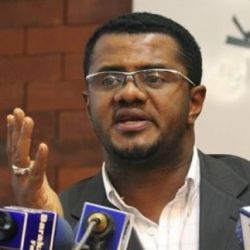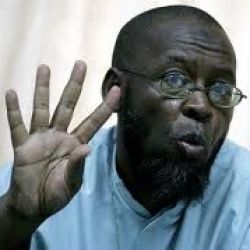According to a document delivered to Gutteridge and signed by Kenyan Immigration Minister Otieno Kagwang, she was deported because her "presence in Kenya is contrary to national interest". The order was dated 22 March 2011.
"States that are truly committed to respect for human rights should allow rights defenders to investigate suspected violations, provide legal counsel and observe public hearings," said Hassan Shire Sheikh, Executive Director of EHAHRDP. "The Kenyan and Ugandan governments should stop obstructing their lawful work."
Daniel Bekele, Africa director at HRW, also commented: "If Gutteridge’s deportation is linked to her investigations into the rights of terrorism suspects, this action by the Kenyan government contradicts the principles of openness and rule of law that should govern a democracy. As yet, the government [of Kenya] has offered no convincing explanation about Clara gutteridge’s deportation, raising concerns that she was sent away simply to silence a critical voice".
The recent twist to this story, represented by the deportation of Gutteridge, adds weight to the suggestion that the stakes, both for Kenya and Uganda, are very high. The story has links also to Somalia, Ethiopia, and the US, through the involvement of the FBI. It also demonstrates how governments in the East and Horn of Africa cooperate in bringing human rights defenders to silence.
 Last month, a group of Kenyan human rights activists led by Kenya National Commission on Human Rights Commissioner Hassan Omar, right, were denied entry into Uganda. Among the four was also Samuel Mohochi, a long-standing associate of the Human Rights House network, and a well-known human rights defender. Mohochi was previously the Director of Independent Medico-Legal Unit (IMLU), a kenyan human rights NGO, and bore witness in that capacity to the election-related violence in Kenya at the country’s review before the UN Committee Against Torture.
Last month, a group of Kenyan human rights activists led by Kenya National Commission on Human Rights Commissioner Hassan Omar, right, were denied entry into Uganda. Among the four was also Samuel Mohochi, a long-standing associate of the Human Rights House network, and a well-known human rights defender. Mohochi was previously the Director of Independent Medico-Legal Unit (IMLU), a kenyan human rights NGO, and bore witness in that capacity to the election-related violence in Kenya at the country’s review before the UN Committee Against Torture.
The four were detained at Entebbe Airport, the main international entry point into Uganda. Upon arrival, despite having all documents in order, the four had their passports confiscated. They were then made to sign deportation documents and were returned to Kenya. According to Omar, no reason was given for their denial of entry, detention or deportation. Unlike six others who were travelling with them, as part of the same delegation, the four never got beyond the airport. The deportation happened despite the fact that the full delegation had an appointment with the Ugandan Chief Justice, and a number of other human rights officials, in the course of their planned two-day visit.
 The obvious cause of controversy was that the purpose of the whole visit was to address the continued detention of Kenyan human rights activist Al-Amin Kimathi, left, who was among the eight Kenyans arrested after the 11 July bomb blasts in Kampala last year. Seventy-four people were killed and many more injured in the attack on a club where people were watching the World Cup final. Kimathi was arrested in kampala when he went to visit a Kenyan youth who had been handed to Uganda by the Kenya police. Ugandan authorities allege that the seven suspects were all recruits of the Somali al-Shabaab militia, who took responsibility for the blasts. The allegation is that the seven had returned from Somalia to execute their mission. "Al-Amin Khimathi provided money to Mohammed Ali, who is still at large, to rent safe houses in Nairobi, which were used as a base for the mission and house the suicide bombers, (…)" reads the charge sheet.
The obvious cause of controversy was that the purpose of the whole visit was to address the continued detention of Kenyan human rights activist Al-Amin Kimathi, left, who was among the eight Kenyans arrested after the 11 July bomb blasts in Kampala last year. Seventy-four people were killed and many more injured in the attack on a club where people were watching the World Cup final. Kimathi was arrested in kampala when he went to visit a Kenyan youth who had been handed to Uganda by the Kenya police. Ugandan authorities allege that the seven suspects were all recruits of the Somali al-Shabaab militia, who took responsibility for the blasts. The allegation is that the seven had returned from Somalia to execute their mission. "Al-Amin Khimathi provided money to Mohammed Ali, who is still at large, to rent safe houses in Nairobi, which were used as a base for the mission and house the suicide bombers, (…)" reads the charge sheet.
In the eyes of both Kenyan, Ethiopian and Somali authorities, Kimathi has been a troublemaker for years. US intelligence has seen him in a similar vein. Now Uganda has come them all to their rescue, by arresting him on terrorism charges, and keeping him in solitary confinement at Luzira; Kampala’s infamous maximum security prison. This is where Kimathi has been for the last seven months. And this situation is what the ten-man delegation came to investigate and negotiate. But not so: Kimathi is too valuable to too many. As a prisoner, that is.
Following the ‘War on Terror’ response to the 9/11 attacks, both local and international strategic priorities changed in the East and Horn of Africa. When Ethiopia invaded Somalia to oust the Islamic Courts Union in December 2006, thousands of people fled across the Kenyan border. There, Kenya’s so-called Anti-Terrorism Police Unit was waiting for them, seizing dozens of men, women and even children, interrogating them and passing them on to Nairobi, where they were held incommunicado.
The year before, in 2005, Kimathi and three colleagues had established an NGO called the Muslim Human Rights Forum (MHRF), out of concern that Muslims were being abused in the fight against terrorism. So, it was MHRF that exposed this renditions scandal that has since become known as ‘Africa’s Guantanamo’. The essence of it was that Kenya, Ethiopia, Somalia and the U.S. were secretly moving prisoners to different African countries. Alerted by victim’s families, Kimathi went to court in Kenya to force the government to produce the prisoners. Instead, Kenyan authorities admitted it had secretly flown 86 people by private charter to Somalia. From there, MHRF’s investigations uncovered, the captives had been transferred to various prisons in Ethiopia, where US FBI agents helped carry out interrogations. Kimathi eventually helped get all the detainees home. According to MHRF, none of them were ever charged with a crime.
Then, after the July 2010 Kampala bombings, something similar happened. Shortly after the blasts, Kimathi raised the alarm again when Kenyan police began detaining local Muslim men and handing them over to Ugandan investigators searching for clues to solve the suicide bombings in Kampala. According to Kenya Human Rights Commission, as many as 13 Kenyans may have been sent to Uganda without court hearings or extradition requests. Kimathi lodged a court application to force the police to reveal their whereabouts, but by the time he did, the ones arrested had already been blindfolded and driven to Uganda. There, they were interrogated by both local police and FBI agents.
Despite realising the risk of pursuing the matter, Kimathi decided to travel to Uganda, in an attempt to assist the detainees. In an email from Kimathi to a colleague 10 August last year, he wrote: "Kenya will definitely turn a blind eye / deaf ear and feign action as the Ugandans work on me theUgandan way, I am told." Kimathi did travel to Uganda later that month, and returned safely to Kenya. But when he travelled again 15 September to attend a courthearing for the renditioned Kenyans, plainclothes policemen arrested hKimathi and his colleague Mbugua Mureithi, a lawyer for the MHRF. Both were handcuffed, blindfolded and threatened with death, tells Mureithi, unless they confessed they worked for al-Qaeda. Mureithi was released after three days.
Kimathi, on the other hand, has been kept under arrest ever since. Kenya’s government denies asking Uganda to arrest him, but admits to not having offered their citizen any assistance either. Government spokesman Alfred Mutua claims the reniditions were legal under a regional anti-terror agreement, and adds that "we’re not sure whether Kimathi is a human rights defender, or if he was involved in the attack". At the same time, Kenya’s Misnister of Justice Mutula kilonzo has said the renditions represented a "failure of institutions" and were made without his knowledge.
Jane Okuo Kajuga, spokeswoman for Uganda’s director of public prosecutions, goes further. She says there is firm evidence "implicating Kimathi to criminal activities". According to the case summary, this includes proof that he gave money to two al-Shabaab operatives, both still at large, to rent a safe house and transport explosives. But Kimathi’s Ugandan lawyer Ladislaus Rwakafuzi says the accusations are false.
Kimathi was denied bail in December, and his his lawyer expects that his second bail application will also fail. Western governments have not requested Kimathi’s release, at least not publicly, and the efforts of groups such as the Commonwealth Lawyers Association, which has called for Kimathi to be freed immediately, are not expected to help either. Rwakafuzi expects Kimathi to be brought to court, together with the ones he once wanted to assist. "Ultimately, it will be the trial that gets him released," says Rwakafuzi.
Meanwhile, a number of other avenues are being explored. Margaret Sekaggya, herself a Ugandan and currently the UN Special Rapporteur on Human Rights Defenders, has been approached at least twice about the al-Amin Kimathi case. Likewise, the case was also raised at the most recent summit of the African Commission for Human and Peoples’ Rights (ACHPR) in Banjul, the Gambia. Following requests from EHAHRDP, a number of diplomatic missions in Uganda have also approached Ugandan authorities regarding al-Amin Kimathi’s case. So far, the response has been the official Ugandan stance on the issue, that Kimathi is being kept in detention on suspicion of involvement in terrorism. EHAHRDP will make sure the diplomatic missions keep up their pressure on Ugandan authorities.
While Amnesty International is considering adopting Kimathi as a prisoner of conscience, the Kenyan Law Society is bringing its own authorities to trial at the East African Court in Arusha for having handed over its own citizens to another state, so far without providing acceptable legal grounds to do so. According to information received by HRHF, a number of other initiatives are also in the making.
Main sources: East and Horn of Africa Human Rights defenders Project (EHAHRDP), Human Rights Watch, New York Times, Daily Nation, Time magazine, and individual human rights defenders in the region.





